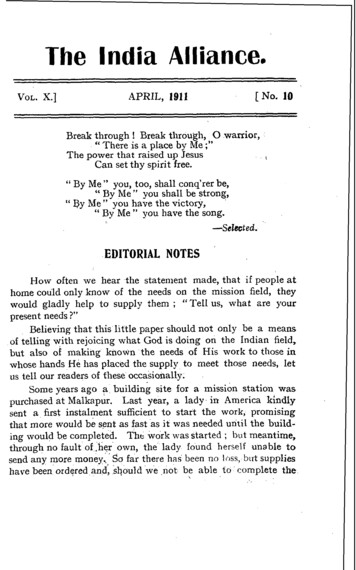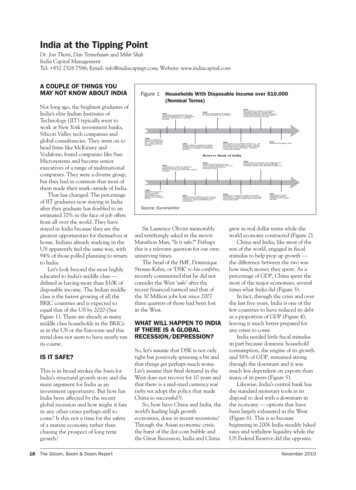
Transcription
The India Alliance.VOL. X.]APRIL, 1911[No. 10Break through ! Break through, 0 warrior," There is a place by Me ;"The power that raised up JesusCan set thy spirit free.I" By Me" you, too, shall conq'rer be," By Me you shall be strong,"" y Me " you have the victory," By Me"you have the song.EDITORIAL NOTESHow often we hear the statenlent made, that if people a thome could only know of the needs on the mission field, theywould gladly help to supply them ; "Tell us, what are yourpresent needs ?"Believing that this little paper should not only be a meansof telling with rejoicing what God is doing on the Indian field,but also of making known the needs of His work to those inwhose hands He has placed the supply to meet those needs, letus tell our readers of these occasionally.Some years ago ? building site for a mission station waspurchased a t Malkapur. Last year, a lady in America kindlysent a first instalment sufficient t o start the work, promisingthat more would be sent as fast as i t was needed until the building would be completed. T h t work was started ; but meantime,through no fault of .her own, the lady found herself unable t osend any more money.,,' 0 far there has been no loss, bnt supplieshave been ordered and, should we not be, able t o complete the
506EDITORIAL NOTESbuilding within the next few months, the rains may causeserious damage.About the same time a donation, amounting to about halft h e cost, was received for another bungalow a t Viramgan in theGujerathi field. This, with what we already had in hand,wauld ordinarily have been sufficient to complete the work,but in Viramgam high prices prevailed and labour was hard to.get, so that though the roof will probably be on before thispaper reaches our readers, yet a further small sum of moneywill be needed for the finishing touches.IIn our December number we told of how Bro. -4ndrew Johnson had collected funds, mostly in this country, for a small(Church a t Pachora. He had already given contracts formaterial, etc., and was ready t o begin work. The ,\ssistantTreasurer ofmission had sent him the first instalment forthe work, amounting to about 175 in a registered letter ; thiswas stole11 from the post office. I do not know that in all ourexperience of mission-work, often sending large sums in this way,our mission has ever had a similar loss. Even should the thief%e found and the notes recovered, which is very doubtful thought h e numbers of the notes have been given t a the authorities,yet there will be delay and somewhat of loss to the work.Could not some of those whom the Lord has blessed withthe means to do so, help our brother out in this case? His.address is Ret7. Andrew Johnson, Pachora, Khandesh, India ;amy sums sent, will, we are sure, be gratefully acknowledged.In our Editorial last month we wrote of the necessity ofmissionary furloughs. Several of our missionaries are nowwaiting to,go on furlough, most of whom are going home a t the4of a second term.In two cases the patties are in such a broken down physicalm a t i o n that the Board have allowed us to draw on them3 once for the money, and they will sail as soon as passages canksecured.It is hard to secure passages now as, owing to theof King George in June next, every European steameris hll,butthis rush wiIl soonbe over and we trust our dear mission-
EDITORIAL NOTES7'9aries will be able to go before long. The other missionaries whoneed to go home are not pet so broken down but, as we said lastmonth, it is poor economy to allow them t o become so, and i tdught not to be thought that a missionary cannot go home untiIhe is so worn out that his life is in danger. This is not theintention of the Board, but how can they help it unless moremoney is sent in than meets the ordinary expenses of t h e workfrom month to m o n t h Will not our friends make a specialeffort and enable us to send about six nlissionaries home thisyear 2RUN IYIOCHEN JATRAW. MOYSEREARING tbat there was to be a large Jatra about eightmiles f r r nour camping place, we a t once decided t o takefour of our workers, with two small tents, and attend. TheJatra is held on the banks of the river Purna in a small villageof ten or twelve houses called Run Mochen, which means " freedom from debt."We left our camping place soon after noon and reached RullMochen about 3 p.m. Saturday. This Jatra is held annually ina splendid grove of tamarind trees, in honour of the godMahadev-orGreat god. He is nearly always worshipped inthe form of a reclining bull.We pitched our tents a t once in a cotton field and, as wethought, a good distance from the crowded part of the Jatra.After eating a slight lunch we were soon all a t work talking,preaching, selling gosjel povtions and distributing tracts. Thepeople were coming all day Saturday, and before the sun setthe people with their carts and bullocks were drawing nearerand nearer to our tents ; yet when we retired for the night thecrowd was quite a comfortable distance from the tents. Allnight long we could hear the rumble and .creaking of the carts,the shouts of the bullock-drivers, and the laughter of the pilgrimsas they settled down in their carts and on the grbund for thenight, or took out their cooking vessels and began to preparefood,On arising early Sunday morning, what a sight met oureyes ! Carts to the right 04 us, carts to the left of us, carts infront of us, carts all around us. As far as the eye could see,
508nothing but carts, bullocks and Pilgrims-carts of every description and size. Here was a cart with a body about two feetsquare, containing four or five people ; there was a larger one inwhich eight or ten men, women and ckildven were packed likesardines in a box. I t is beyond my comprehension how ever theyretained their seats or held on. There were bullocks of all sizes,shades and conditions; here were a pair of beautifully matchedbulls, decked with brass bells and gaudy blankets, belonging t osome rich farmer or merchant ;there were another pair of scrawnylittle fellows, looking as if they had not had enough t o eat formonths.On entering into conversation with the people we foundthat thousands had driven in their springless carts over crosscountry roads, scores and hundreds of miles to visit this sacredshrine. Here were young and old, rich and poor, all hoping t oacquire spiritual merit, and be free from the debt of sin. Itwould be impossible t o describe the clothing of these people ; a noriental religious gathering cannot be described, for in theirsaries, blankets, turbans, etc., there is a blending of everycolour inthe rainbow ; for here are men and women dressed in their holiday attire, of bright and startling colours, decked out in theirbest jewellery, while there are men almost nude wearing simplya small loin cloth. Over yonder see a man dressed out entirely inEuropean costume (which does not usually become him), whileagain we see one betwixt and between, perhaps he has a brightred turban, a green coat, white loin cloth, a pair of Englishsocks and no shoes. We soon s a w that the native proverb, viz.," that three kinds of people attend these sacred shrines, Howshi,Nowshi and Go.as!;i," was really appropriate. The meaning ofthe proverb is, Howshi -those who g o only for pleasure; Nowshithose who go to pay vows and to worship ; and, Gowshi-thosewho go for evil and evil only. We did not sleep much all nightcn account of the noise, dust and smoke. The carts, bullocks,and people were now jammed close t o each other, yea, they hadeven encamped between our tent ropes on every side but the oneon which our own bullocks and carts were standing. It lookedmore like a good natured crowd out for a picnic, than men andwomen who had come miles, some of them a t considerable costand trouble, to perform religious rites and ceremcnies. Afterprayer Sunday morning we decided that the forenoon would notbe a good time for public preaching, as most of the people werenot properly settled down, and had their cooking t o do for the'day. ,So me s p a r a t e dt o do personal work with individuals andsmall groups, and also to distribute tracts until noon. Early i nthe forenoon I wandered down t o the river bank, near to the place',-RUN MOCHEN JATRA
R U N hIOCHEN JATKX99where the central image of the god Mahadev was situated.Here the scene was entirely different, streets, lanes and alleyscomposed of stores, selling grains, flour, brass-ware, pots, household utensils, dried buffaloe-dung for fuel, toys, books, sweatmeats, fruit, and the brass gods of the Hindoo Pantheon. Herealso were theatres, music halls, swings, merry-go-rounds, picturegalleries exhibiting their 330,000,000 gods, plays or dramasrepresenting the Epic of Rama and the giant R a w n , and thegod Krishna with his 16,000 wives. These lanes and streets ofstores all radiated to the central figure and shrine of Mahadev,represented by a reclining stone bull. This idol was set upon ahigh platform about fifty feet above the river and perhapsseventy-five or one hundred yards away from it. From thisplace a nicely stone-paved roadway about eight feet wide runs,with an easy incline, into the river. Here a great transformation scene took place. Near this central platform were menselling flowers for offeringsto the idol, and although yet early inthe morning, and very chilly for India, the platform was crowdedwith priests and worshippers. The priests who were almostnude, having simply a garment for the loins which barelyreached t o their knees, were busy attending the idal and receiving offerings from the people. The paved roadway was onemass of struggling, shivering devotees - who brought theirofferings to the ido!, perambulated around the platform, andmade a deep Salaam to the god a t each of the four corners of theplatform.Then they marched down the paved roadway to the river,took a bath, and also bathed one of the gods in the river. Herewere men, women and children of all ages ( yea, some so old andcrippled that they had to be carried into the river,) plungingunder the water, which by this time had become a stream ofmuddy, defiled filth. Each worshipper had to carry a brassvessel of water from the river and pour it over the gods on theplatform ; this water made a steady stream of slush and filth inwhich all the corners and goers to either the river or platform hadt o walk ; this ran back down the paved roadway into the riveswhere hundreds were washing and b a t h i g . This same waterwas used for all cooking and drinking purposes by the pilgrimsthat attended theYatra. We had to go nearly two miles to get aclean drink of water either for ourselves or our bullocks.Great jams occurred on this paved roadway, sometimes thepeople were packed so tightly that they could neither ascend nordescend, and the roadway was now almost as slippery as glass.In some of these jams on the roadway or in We river, w,e heardthat three persons were crushed to death or drowned. Oh howour hearts were saddened as we saw thousands of people - who
sroR U N .MOCHEN JATRWhad travelled miles to bathe at this place, w worship this god,arid each of these devotees abstained from all food for 48 hours inthe hope of obtaining freedom from sin-bow down t o this filthy,unclean, opiumaeating god (and not all ignorant men either),and believe that this could wash away either the filth of the bodyor of the heart ! How we prayed that they might know about thefountain opened in the house of David for sin and uncleanness !But how few to tell this wonderous story ; truly, "the fields arewhite to harvest but the labourers are few."One side of the paved roadway was reserved for Sadusor holj men who were sitting nearly nude wearingonly a very small loin-cloth, or smeared over with ashes,and their hair plaited with tow and tied up in a great heapupon their heads and appearing almost a dozen times thenormal quantity. These Sadus were one-and-all begging almsfrom the people who passed up and down the paved roadway,and the people are taught t o believe that feeding these Sadusand holy men gives them merit in the sight of god and man;yet it would be hard to find a more worthless class in all India.The pilgrims on Sunday afternoon began to gather intonumerous bands and companies of from fifty to several hundreds.These bands are called Dindi, and they sing songs or hymnsin honour of some special god ; hymns composed especially infavour of Mahadev were sung here.These bands of men marched from one shrine to another,singing lustily, and were led by instrumental music.We could not go into the grove and hold an openmeeting because of the crush, and all traffic would have beenstopped. Looking to God for guidance, we decided to go intoa large cotton field, where several of these Dindies were, wherewe had very little thought of getting a crowd, but looking t oGod we begun to play on our cornet, and before the first,hymnwas finished we had all the crowd we could attend to untilevening. It was the largest audience the writer has seen for rnanyaday. How we prayed, as each worker spoke in turn ! God was withus and blessed His own Word; the crowd listened so veryattentively as we preached Jesus and Him Crucified, to men whobad never heard of the love of God as manifested in His SonJesus Christ. Men peered eagerly into our faces as we told themthe old, old story of redemption through the Cross.We told them of the purity and love of Jesus who came to.eek and save from sin those that are lost, in contrast t o oliftless stone who represented Mahadev, an opium-eating go&We spate in turns, and some of us several times, until theevening shadows gathered, and we retired, committing the day's
SrrRUN MOCHEN JATRAwork to His hands, trusting that sdme seed may have fallen intogood ground and bring forth fruit unto eternal life.The crowd continued to increase all day Sunday andSunday night. On Modday A. hr. I met a Government Officerwho was there in charge of the police arrangements, etc., andenquired of him the estimated number of pilgrims. He said thatthere were then present between o o , mand 150,000 people ;this is the largest numbet that have ever gathered itl this place.Monday was the last and the great day of the Yatra. We we*out early in the morning, with our arms filled with gospel portions and tracts, which we prayerfully offered the crowd for sale.Everybody was on the rush, the theatres, shows and stores wereopen from early morning; traders were anxious tb dispose oftheir goods ; priests and Sadus were busy reaping their harvest.The Missionary and his workers were in and out of the seethincrowd all day long, and before evening we had disposed of aour gospel portions. With grateful hearts we pray that HisWord shall not return void. In one of these Yatras the writersold over a thousand scripture portions in three days. Whilewe were eating our lunch, Monday afternoon, we noticed that oneof these Sadus had left the river, and was very intently engaged insomething just opposite our tent. I walked quietly over, andfound that he was just going through his noon-day worship.After a little conversation I found that he was a Sadu fromnorthern India and so understood very little Marathi. He hadopened a small round brass vessel, from which he took tbgoddess of lust and after carefully bathing it, he set it in an upright position, placed several small brass dishes before i t whichwere filled with offerings, then burned a small tablet of campbkbefore it, all the while repeating some verses from the Purannas,bowing himself down several times, still repeating his etition orverses; then taking some red and white pigment rom o t kboxes, he, with the aid of a small Iooking glass, carefully madehis god's mark' upon his arms, breast and forehead, then onceagain bathing his gods and giving a farewell blast on his c o dshell he packed them all away again, and his worship was over.The whole kit reminded one of a little child's set of toys. Hetried to explain it all very pleasantly to the writer, who soughtto turn his eyes to Jesus Christ who alone can save from sin.Blind leaders of the blind; " yet how shall they believe in Him,of whom they have not heard ? and how shall they hear withouta preacher ? and how shall they preach except they be sent ?Who will say-Here Lord am I, send Me ? Pray much for usas we go in and out that we may live and preach Jesus a perfectSaviour for aZZ men.8P
. .GOD'S PREVENTlNa GRACEBY M. RAMSEYIN several places in the Word of God we find an expressionwhich a t first sight is a little puzzling, as for instance, inPsalm xxi. 3, where it says, "Thou preventest himwith the blessings of goodness," Ixxix. 8, " Let Thy tendermercies speedily prevent us," and also in several other places.In the Common Prayer Book is a collect some of us learnt inchildhood, " Prevent us, 0 Lord, with Thy most gracious favour,"&c. It has taken a good many years to learn the meaning, butof late some of us have been studying a little by experience of it,which is after all the surest and most wholesome way of learning. This old-fashioned and literal way of using the word isvery instructive and helpful when you get used to it ; not justto hinder us, but rather to go before us ; often hindering, indeed,something from meeting us or from harming us, just becauseHis tender mercjes were on ahead and so came between.Many are the times we have been thus prevented withoutour own knowledge, but some times our Father gives us aglimpse of what might have been, by letting, as it were, Hispreventing grace slip a little to one side.Many years ago, a person with whom I was slightlyaquainted slipped on a banana peel, fracturing his skull anddying instantly, and ever since when my own foot slips "Thankyou, Jesus, for preventing mercy," comes involuntarily to the lips.In these later days there have been some instances of thisamongfly friends. A few months ago a number of our dearMissionaries seemed to be very near the gates of death, butsomebody's prayer was instrumental in bringing God's preventing mercy between, so that the death-angel was warded off andmany a " Thank you, Jesus !" was breathed from our glad heartsfor lives spared. Then, too, we have not all been down sick, butkept in health, with our reason and all our senses given afresh,morning by morning, after the night's sweet refreshing sleep."Common qescies," we say, but why so Common ? Is it notbecause our loving Lord chose, in love, to prevent us with them,giving so freely of His goodness ?A short\tirne ago, some Missionary mothers stepped on a traint o say a last word to their " wee ones" on the way to schoolmany miles away.The train started suddenly and one of the mothers wasinside ; springing out she landed safely on her feet, but the forceof the moving train caused her t o fall on the stone platform.She might have been badly injured, but she was not, just a few
bruises permitted, to remind us of the preventing mercies ofour God.About the same time we heard of a similar case a t anotherrailway station, and still another, where the Missionary wascoming down the steps from the bridge across the railwaytrack, when his foot caught on the step and he was falling headlong with full force, when an unseen power intervened andenabled him to catch hold of a support in passing and he knewthat the tender mercies of I-Iis God had prevented him.Another, a bicycle accident, through which the threatenedconcussion of the brain did not come. Why did i t not come?Prevented by the mercies of God.Still another, a motor car, a motor tram, a carriage, a trenchwith an iron sign-post, and a Missionary on a bicycle. Notmuch time for thought, and the result a cut and bruised face,a badly bruised hand and almost a fainting spell on the crowdedstreet. But thank God, for His preventing mercies that werein between ; for a touch of life, and for a speedy healing of thewounds., .From those out in the districts where plague, small-poxand cholera are rampant, letters are coming daily, reminding usin many ways of God's preventing mercies, and calling upon oursoul and all that is within us to " bless the Lord and His holyname." We find almost endless cause to praise Him for justthis one aspect of His mercy toward us. And if, with David, weset ourselves to view God's ways and works, we shall, like him,too, find only one word with which to express our gratitude,again and again as he does in Psalms 146 to 150. Hallelujah !Hallelujah I Hallelujah!A VISIT TO THE INSANE ASYLUMBY M. RAMSEYSEVERALweeks ago two of us went t o the insane asylum tosee Yeshwantrao, and although he was much better then, itwas pitif111 to see him lapse into a sort of vague thoughtwhich was really Melancholia. Since then we have seen himtwice, The first time he seemed better mentally, but wassuffering much from malarial fever. He was able to joid inprayet, and he asked the Lord to release him soon and let himgo home to his village.It was painful to hear him spoken of as a " crimichl" byYie aajlum authorities. Those who ate praying for him @ill
remember that he plunged into the tank in his frenzy, but withno thought of taking his own life. On inquiry it is found thathe will be formally discharged a s soon as his clismissal fromthe ifisane asylum is granted.The last time we visited him, i t was a glad sight to see hisopen countenance and receive a friendly hand-shake. He wasaltogether rational and conversed as any sane man would do.He renewed his plea to be taken home, and it was hard to havet o say that lie must wait a while longer. The Committee willnot meet again till June. Fray that he may be dismissed fullyrestored, and do please pray for him as he faces his relativesand caste people again. His head-manship has been given toanother.During our stay, tie said so brightly, " I atn a Christian,"and the dozen or more men present, like himself partially orwholly recovered, testified that lie was a Christian, and that hesang for them and taught them from the Book.We left a number of C;ospels after a good gospel messageto attentive listeners. Pool. souls! our hearts were sore as wehere and there tvould detect the look in the eye that we havelearnt t o recognize since beginning to visit them.The matron kindly allowed me to bring a Bible-woman in,and she with a dear Indizn Christian was among the women, afew of whom are Christians. One little woman, who ' was ateacher, has been there for months having lost her reason, partly,if not altogether, through her husband's cruelty. We found hermuch better mentally, but physically very weak from lack offood. Her under-jaw seems paralyzed from not being used, andshe is fed tllrougll the nose. She signed to us to sing "Whatcan wash away my sir] ? " and asked for prayer. Her cries arepitiful when a realization of her condition comes over her.Won't some one please take her on their heart ! A number ofwomen were in the room, and I stole over to a sad little bodyand, having heard her story, toltl her of the Sinner's Friend.Had she ally friends ? Yes, a husband ? Yes, children ? Ah,that's it, how can I tell it, she said. Tears came and little bylittle she whispered, " I t is for my child I am here, I killed him."How ? " I don't know ; they tell me I did it, but I don't remember." The matron said her tale was true, She is well now andshrinks from the ttial in court, and her heart is sore. Stillanother a11d another 1 might tell you of, but just one more forthis time. T o the few who could rkad we gave Gospels, and awoman we had rioticed before with foolish insanity depicted inher every movblnent eagerly took a book in her hand sayisgshe could raid a little,
sf5A VISIT TO THE INS-ANE ASYLUMThe book opened a t random (?) St. Mark's Gospel, ninthchapter, and she began to read a t verse seventeen. With 9 littlehe1 she read on to the twenty-ninth verse. Dgar irl J sheun erstmd some, 1 understood more, and as we spel% out thek t verse together, my soul cried out to Gad to see His OWN,even as our Lord Jesus pramised before He went away t .qt yeshould.That other word began to ring in my ears, "The wholecreation groaneth and travaileth-and-we ourselves groaowaiting for the adoption, t o wit the redemption of our body."The Lion of the tribe of Judah hath prevailed to oplen thatredemption book.Is i t that His Church, His Body, is slow or careless abouttheir share in bringing in the full redemption ?Perhaps like David our Icing is saying to some of us, " Whyare ye the last to bring the King back ? "A kind Christian lady in Bombay had sent a large bunch offlowers, and as we turned gateward, Yeshwantrao stood withhis shwe of the flowers treasured in his hand waiting to escortus a little way. There were sneers from some of the otherlunatics a t seeing him walk and talk with a mem-sahib. The.usual little " tips " a t the gates, the ride over the dusty road tothe station, conversation with the vendors on the station whoon a former visit had become interested in the gospel stoqy,the one hour's journey in the train, the veritable babel innearly all but the seats we three occupied, the quiet nativewoman who said she had met just such peo@e as we Qncebefore and they had talked about the same things, the sweetconverse one with another as we spoke of "Him Whom havingnot seen we love," and the station in Bombay was reached.Tired? Yes, a little, but so happy because in a little measureone could say with Paul, " He counted me faithful, puttingme into the ministry."Oh, to be nothing-Only-abroken and empty vessel.Only-a messenger at His gateway !8B-- -- -W----A FRIENDLY COWAR1 0NBY DAYID McKEEnear the village of Rethal I was visi.tcd byBrahm n,w o in official capacity is a tax collector.HiLEcampin%eI found him to be a man exceedingly well versed in hisown religion, a firm believer in it, and a real active &fender .of k i t h ejtrnestly endeavouring to persuade others to believe asbe did.
516A FRIENDLY COMPSRISONFor this purpose he called upon me and very earnestlyrequested that I listen to h i m for a time while he revealed thepower and secrets of his religion. I agreed on condition that hewould allow me to ask questions, i.e., the plan of salvation contained in their scriptures ; t o which he agreed. He gave a longexplanation regarding the plan of salvation as contained in theVedas and other books pertaining to their religion.After which I began to ask him questions and proofs, i.e., theway of salvation, and, in every instance, he failed to give me anyground upon which I could hope for the salvation of any man.Through the questions that were asked he himself caught aglimpse of the fruitlessness of i t all, and confessed that of a truth i twas all useless. After this we spent some hours testing the greatplan of salvation as given in the Word of God. After a carefulinvestigation he was led to see God's plan of salvation throughHis dear Son and then he exclaimed, " It is all true, it is all true."I strongly endeavoured t o persuade him to accept Christ now,but he said," the plan is beautiful and true and perfect to the end,but it would be useless for me t o try to stand alone against somany who are enemies of this religion." So his heart failed himand he entered into contract with satan to wait for a while.Procrastination is a mighty fulcrum over which the enemyupsets and destroys very many good desires and plans whichpeople truly and earnestly intend to perform. I feel more andmore that our united cry as a Church and people should be, Lordbreak down these barriers that so much hinder these weak andhungry people from entering Thy fold and enjoying the boundlessfullness of Thy love, mercy a n d saving grace.MRS. SORABJlAFTERa long and useful career, there died a t Nasik near thedose of last year, a t the age of seventy-six, one whose namemight be classed with that O F Pandita Ramabai as abenefactress of her race and nstion. The following account ofher life and labours is taken f o m" T h e Epiphany."Mrs. Sorabji, widow of Rev. Sorabji Kharsedji, who passedaway a t Nasik in her seventy-sixth year, is loved by many inEngland and India, and her name a s a n educationalist will longbe connected with the Bornbay Presidency. With her husband,in the early days of her marriage, she founded the IndustrialSchool and village a t Sharanpur, near Nasik ; later in life, whenher children no longer needed her attention, she again gave herself to work for the country she loved so well, and before her
MRS. SORABJI5I7death she had founded five Schools and left them, in handsomebuildings of their own, to those who were capable of carryingon the work she had initiated. She perfected everything towhich she put her hand, and all in the silence of loving service,seeking no reward.But more than educatianal instittitions, more than bricksand mortar, is the memory of a great personality which shehas left behind her. She seemed to combine all that was best inEast and West. Spirituality, devotion, and the power of selfsacrifice-the great gifts of tact, insight and loving sympathyall these were hers in no small measure ; and to these she addedWestern ideals of honour and duty and the service of others, ofefficiency and the joy of work, with the purity of heart andsimplicity of faith of a little child.It was impossible to be outside her sympathy : she alwaysunderstood. To her came people of every race and everystation in life : they brought lier their joys and their sorrows,and she failed none. Without word or thought of reproacli, sheyet made one feel ashamed of all that had been unworthy inone's liEe : yet-if this can be understood-she nlade one ashamedltopefzilly, for one always said to one's self, " to-morrow I'll bebetter, it must be worth while trying."One who was with her during the last week of her life, in thequiet, peaceful home where she ended her days, found on thewall of her bedroom the words, " I believe in God." It wasindeed what her life seemed to say to those who knew her. Shebelieved in God ; she believed in the best in ev
purchased at Malkapur. Last year, a lady in America kindly sent a first instalment sufficient to start the work, promising that more would be sent as fast as it was needed until the build- ing would be completed. Tht work was started ; but meantime, through no fault of .her own, the lady found herself unable to











